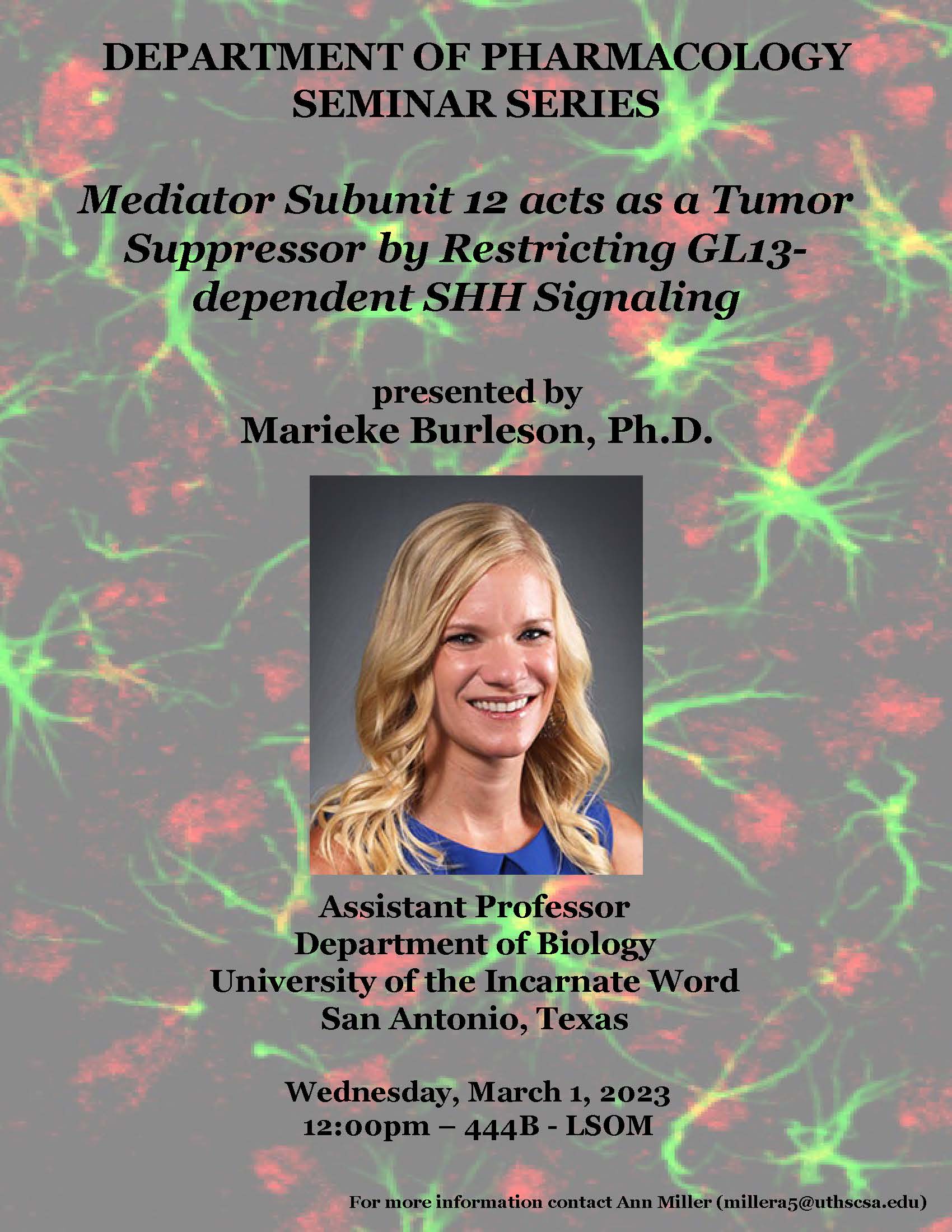Seminar – Marieke Burleson, Ph.D.
Event Date & Time
March 1, 2023 at 12 NoonLocation
MED 444BEvent Details:
DEPARTMENT OF PHARMACOLOGY
SEMINAR SERIES
Wednesday, March 1, 2023
12:00pm – 444B LSOM
Marieke Burleson, Ph.D.
Assistant Professor
Department of Biology
University of the Incarnate Word
San Antonio, Texas

About the Speaker(s)
 The Burleson lab focuses on finding new therapeutic strategies for specific subtypes of cancer. Cancer is currently the second leading cause of deaths worldwide, following in close proximity behind cardiovascular disease. Though radiation and chemotherapy have been the frontline choice of treatment for cancer over the past few decades, due to the detrimental side effects, personalized treatment is rapidly rising as a superior treatment method. This is largely due to recent advances in genome-wide DNA sequencing that have allowed for the identification of cancer-related mutational landscapes. Through these technologies, it is now feasible to identify oncogenic mutations that are unique to particular cancer patients. Once a mutation is identified, a personalized treatment regimen can then be designed that will specifically target the oncogenic signaling pathway(s) that are affected by the mutation thereby eliminating all the detrimental side effects of global drugs, such as chemotherapy. It is thus critical to identify novel oncogenic mutations and, more importantly, to investigate the signaling pathways affected by these mutations.
The Burleson lab focuses on finding new therapeutic strategies for specific subtypes of cancer. Cancer is currently the second leading cause of deaths worldwide, following in close proximity behind cardiovascular disease. Though radiation and chemotherapy have been the frontline choice of treatment for cancer over the past few decades, due to the detrimental side effects, personalized treatment is rapidly rising as a superior treatment method. This is largely due to recent advances in genome-wide DNA sequencing that have allowed for the identification of cancer-related mutational landscapes. Through these technologies, it is now feasible to identify oncogenic mutations that are unique to particular cancer patients. Once a mutation is identified, a personalized treatment regimen can then be designed that will specifically target the oncogenic signaling pathway(s) that are affected by the mutation thereby eliminating all the detrimental side effects of global drugs, such as chemotherapy. It is thus critical to identify novel oncogenic mutations and, more importantly, to investigate the signaling pathways affected by these mutations.
The current interests of the Burleson lab focuses on the role of SPOP in additional cancer subtypes. In addition to SPOP being mutated in a high proportion of prostate cancers (15%), SPOP has also been found to be mutated, downregulated, or overexpressed in a variety of other cancers, including breast, ovarian, endometrial, and thyroid cancer. Therefore, the Burleson lab is utilizing CRISPR/Cas9 genome editing to engineer SPOP mutations in a variety of cancer cell lines. Furthermore, lentiviral shRNA strategies are also being employed to engineer stable SPOP knockdown and overexpression cell lines. Once stable cell lines have been generated in the various cancer subtypes, a variety of natural compounds are then tested on their ability to reverse the oncogenic effects of the specific SPOP alteration. These studies will ultimately lead to the discovery of novel therapeutic strategies for specific subtypes of cancers that contain SPOP alterations.
